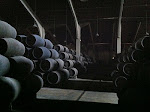The Perils of a "Natural Wine" Label
This post is my contribution to Cory Cartwright's 32 Days of Natural Wine, on his blog Saignée:
The other day I went to a small wine shop because they had a particular Champagne that I wanted to bring to a wine dinner. I saw it on the shelf and let it sit there as I browsed the rest of the selection. The woman behind the counter came out to talk with me as I looked around. She was very pleasant and also very proud, rightfully so, of the wines she chose for her store. She was talking about her favorite summer wines and she pointed to Dominique Derain's Allez Goutons, a distinctive Aligoté imported by Jenny & François, and said "This wine drinks like beer. I bring it when I'm hanging out with beer drinkers - they always like it."
I'm familiar with Allez Goutons and I like the wine very much. I think I see the connection with beer, as the wine is cloudy, low in alcohol, and sometimes a tiny bit spritzy. I imagined serving the wine the next time I cook something Vietnamese or Thai, something spicy. Then I imagined those beer drinkers she was talking about, tried to picture them. Would they be more or less interested in Allez Goutons if they knew it is a natural wine? The word "organic" on food is appealing to consumers - would the word "natural" on a bottle of wine make it more appealing to customers?
A simple means of identifying natural wine would probably help the average consumer. Imagine something like the Demeter certification, but not only for biodynamic wines, for all natural wines. When shopping for wine, discerning between natural wines and other wines would become as simple as discerning the reds from the whites. There are many people who eat consciously and carefully, yet unknowingly accept the destructive farming practices and the frightening chemicals used to make the wines they drink. Proper labeling could help these folks to spend their money on wines that jibe with their ethics regarding food.
And you know what - in spite of all of that, I sincerely hope that this kind of labeling never happens. Natural wine is a legitimate movement, and as such, it is at risk of being co-opted by the marketing folk. The "natural" label, as I see it, might do more harm than good.
Remember when the word "organic" really meant something? It wasn't all that long ago when the most common way to buy organic food was at your local farmer's market - organic produce was scarce in supermarkets. Now organic food is everywhere, and anything can be organic. Dole sells organic bananas and there are Organic Cheetos. Soon we might see organic Dick Cheney and organic BP, and the sad part is that people will feel better about them once they're organic.
"Organic" has become a marketing term as much or more than it is an indication of the healthful qualities of a food product. What does it even mean to say that food is organic? From the USDA Agricultural Marketing Service:
Organic production is a system that is managed in accordance with the Organic Foods Production Act (OFPA) of 1990 (PDF) and regulations in Title 7, Part 205 of the Code of Federal Regulations to respond to site-specific conditions by integrating cultural, biological, and mechanical practices that foster cycling of resources, promote ecological balance, and conserve biodiversity. The National Organic Program (NOP) develops, implements, and administers national production, handling, and labeling standards.Sounds good. But think about the way this actually works: food ingredients are scrutinized by a governing body and either approved or disapproved for use in organic food production. If a food producer can show that they only use ingredients and techniques that are approved by the governing body, their product can be labeled as organic.
I poked around the website and looked at three petitions for approval of chemicals in the production or handling of organic food products, selected because their names sound vaguely frightening, but otherwise chosen randomly.
Octadecylamine is a synthetic material that "forms a molecularly thin film on the interior of steam lines." This chemical is a boiler water additive that prevents the corrosion of boiler water and boiler water distribution equipment. The petition points out that no toxic effects were found when Octadecylamine was fed to rats or dogs. In spite of this, the petition for use in handling organic food products was apparently denied.
2,4,7,9-Tetramethyl-5-decyne-4, 7-diol "is used as a wetting agent, de-foamer, rinse aid, viscosity reducer, penetrating agent, and lubricity additive in industrial applications as well as consumer products." From what I can tell, it is an inert ingredient in pesticides. The FDA didn't approve it for use as a food additive, but the Environmental Protection Agency has apparently granted it three exemptions so far, and it was not approved for use in organic products.
Sucrose Octonoate Esters "act as biopesticides by dissolving the waxy protective coating (cuticle) of target pests (e.g., mites), causing them to dry out and die." Hmmm, it dissolves waxy protective coatings, but I'd like it be sprayed on the wheat that goes into the cereal that my daughters eat. This substance was approved for use in organic food production.
Actually, one out of three is really not that bad. What were you expecting?
In my real life I work with people in city and state governments, and I've intimately seen and occasionally been part of the amazingly bureaucratic mechanisms that create and implement public policy. People say things like "They should have rigorous standards for deciding whether or not something is organic or can be used to make organic products," and I agree with them. But it's easy to forget that there is a concrete set of operations that must occur on order for that to become a reality. And I'm talking about after legislation passes. I'm talking about the actual mechanics of the process of implementing standards. A group of human beings is responsible for reviewing these petitions, and they have bosses who can override their recommendations. Who knows how these decisions are really made - do you, or does anyone you know actually follow these petitions as they work their way through the machine?
Yet most of us are content to accept the healthful and environmentally friendly implications of "certified organic" on our food. We are probably putting too much trust in our governmental organizations here - there are lobbyists and lawyers and various interested parties involved in the production and labeling of food, just like there are in the oil industry. If there were an entity charged with deciding the wines that receive the "NATURAL WINE" label, why would that process be any less problematic? In the end, I imagine that natural wine as a label would mean as little as organic means now means in a couple of years. Then again, we might be able to buy things like Yellow Tail Natural Shiraz, and that would be great.
We have wine labeling problems already. Wine makers sometimes have to lie a little bit to the government bodies that regulate the labeling of their products. They might say that only Nebbiolo or Pinot is used, but do other grapes ever make it into the final blend? Historically, the answer has been yes. The label says 13% alcohol, but could it really be higher? Yes. The labels don't tell us other important things too - whether or not the wine was chaptalized, whether or not industrial yeasts were added for fermentation, and so on. I've heard stories proudly told by wine insiders about various bottling chicanery, like the one about the same exact wine being bottled as two different wines at different prices. The only way you will ever truly know what's in the bottle is if you come with a chemistry set.
I hope that as natural wines become more and more popular with consumers, that we do not give in to the temptation to ask a government body to do our thinking for us. Those of us in the wine business, and folks like me who simply drink a load of wine - we can continue to make our purchasing decisions on our own. But somewhere down the line, a group of marketing types are going to argue that there should be some agency with a method for reviewing wines and deciding which are NATURAL. I hope we are wise enough to resist.







1 comment:
Well said.
Post a Comment